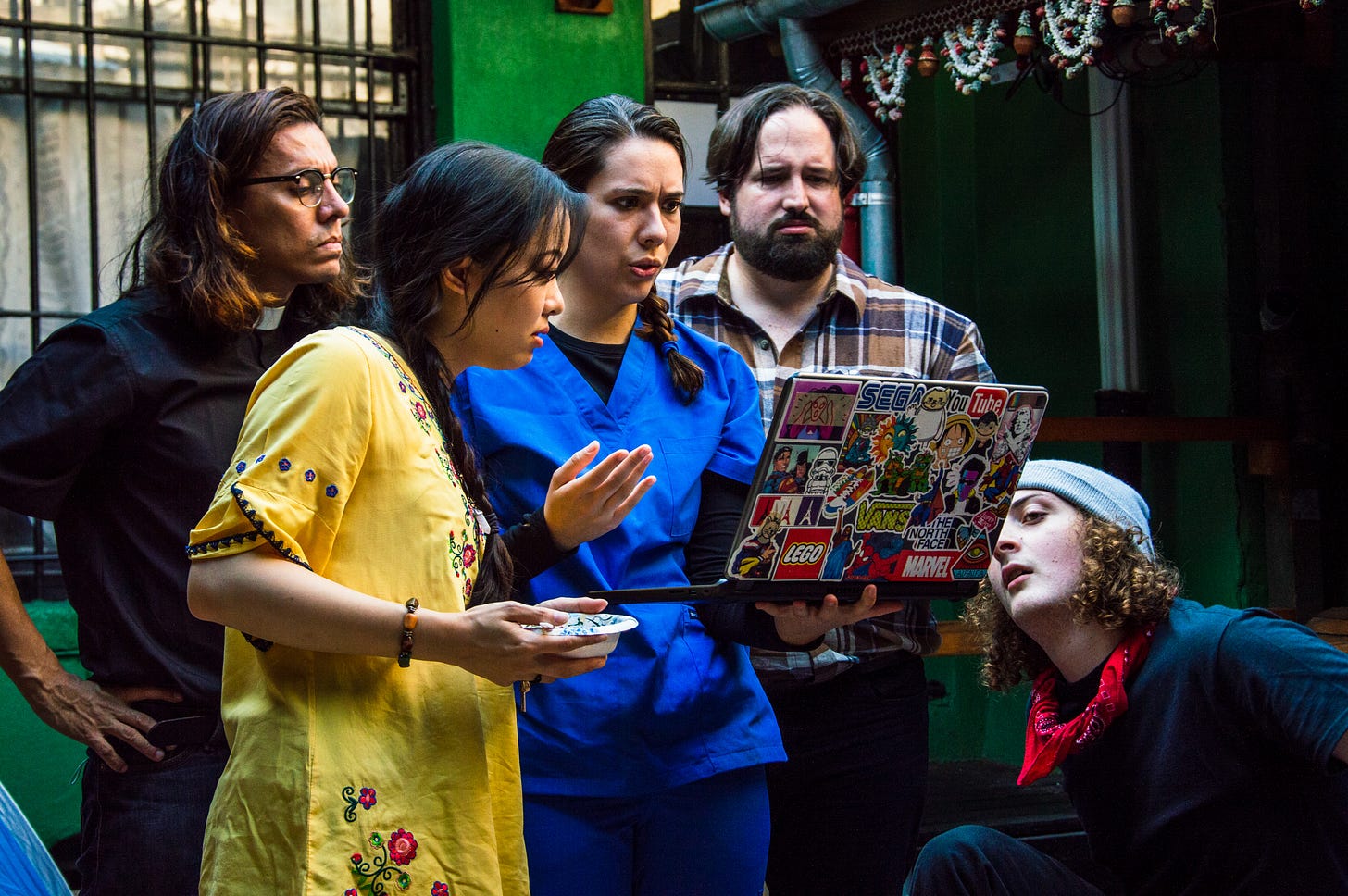Ten Years After Zuccotti Park, 'Occupy Prescott' Considers the Legacy of a Movement
Indie company Theater In Asylum returns to in-person work at Jalopy Tavern in Red Hook

In a public park outside a courthouse in Prescott, Arizona, five people gather to create a better world.
Andy Boyd’s new play Occupy Prescott begins in the fall of 2011, during the Occupy Wall Street protest against economic inequality in Zuccotti Park. Though protesters were removed from the park by mid-November, Zuccotti brought new attention to issues of wealth inequality and corporate greed and triggered a wider Occupy movement across the country.
One of those offshoots was in Courthouse Square in Prescott. That is where Boyd’s play, presented by Theater in Asylum at Jalopy Tavern in Red Hook through October 31st, turns its eye. Occupy Prescott marks a return to in-person performance for Theater in Asylum, a small company devoted to community engagement and an ensemble-driven approach. The production also coincides with the 10th anniversary of the Occupy movement.
For Asylum’s co-artistic directors, Paul Bedard and Katie Palmer, Occupy Prescott’s themes of social justice and direct political engagement made it an ideal return to in-person programming (following extensive digital work that is still ongoing).
“What I love about this play is that it’s bristling with hope—coming from a movement that did not achieve, explicitly, what it said it wanted to achieve,” said Bedard. “But I see a straight line from the work of Occupy to the two Bernie campaigns, to Black Lives Matter, and to the current fight in Washington for the biggest expansion of the social safety net since the New Deal.”
“So much of the current energy in the left came from the redefinition that the Occupy movement was able to give us,” added Palmer. “It was a lot of our political awakenings, even if we didn’t totally know it at first.”
If that makes Occupy Prescott sound like a chore, the play is actually very funny. Tough issues are hashed out, including land use, universal healthcare and reproductive rights—but Boyd is most interested in the slow, often maddening day-to-day reality of actually being part of a movement.
“At their best, movements for progressive change can be a prefiguration for a world that doesn’t fully exist yet,” said Boyd. “But that’s 0.1% of what it’s actually like to be in a movement. A lot of it is, ‘I can’t fucking stand this person,’ or, ‘This meeting is too long.’”
The five Occupiers include a progressive priest, an aging hippie, a nurse and single mother, a young anarchist and a libertarian rancher. They’ve all shown up because they believe the 1% has grown too powerful, and that a fundamental shift in the economic order is needed. But finding consensus on specific demands proves challenging. The group’s attempt to draft a “Statement of Principles” threads throughout the play, constantly derailed by new stumbling blocks:
The sustained commitment needed to craft community agreements, or rework a mission statement, are familiar to any theater company in this period of upheaval within the industry. Since last August, Theater in Asylum has been meeting regularly with seven other small theater companies, conducting peer lead discussions and bringing in facilitators to help apply the demands of We See You, White American Theatre to indie companies with limited budgets.
“Whenever you’re trying to collectively agree on complicated things, it takes a lot of discussion and it’s often very frustrating,” said Palmer. “The work is really important, but also takes a lot of time. So how do those two things live together?”
For Asylum, the conversations remain ongoing, but the company has crafted a Community Agreement which guides its productions, posts its budget and salaries publicly for transparency, and is hosting post-show panels and songwriting workshops during Prescott to put the questions of the play to practical use.
In Boyd’s play, monentum proves more elusive. Divides form within the group once they are instructed to leave Courthouse Square or be arrested, raising the question of how much each of them is willing—or able—to sacrifice for the movement. That statement of principles never does gets completed.
Still—connections have been formed, and some seeds may have been planted.
“I definitely write plays to try to get people to join movements for social change,” said Boyd. “I want people to see the play, and then make the next movement happen.
“In this play, they all showed up because they want to be a part of Occupy Prescott. They all show up for the same reason. The next step is harder.”






